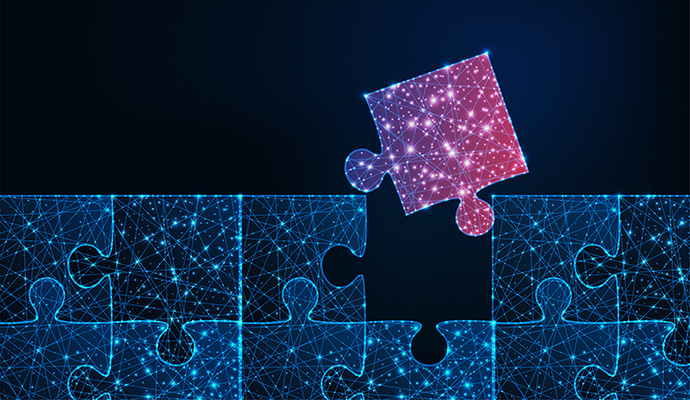Health AI, Biomedical Discovery Projects Win Grant Funding
DePaul University and Rosalind Franklin University of Science and Medicine are funding three research projects looking at AI, biomedical discovery, and healthcare.

Source: Getty Images
- DePaul University and Rosalind Franklin University of Science and Medicine have announced funding for three interdisciplinary research projects aimed at leveraging artificial intelligence (AI) to advance human health.
The projects will combine AI, machine learning (ML), robotics, geography, and biology to investigate how advanced technologies can positively impact biomedical discovery and healthcare, according to the press release.
The first project sets out to predict and prevent falls and related injuries among patients and members of the military through the use of GPS mapping and robotic sensors.
“We can tell a lot about a person’s health from how they walk,” said Sungsoon (Julie) Hwang, PhD, professor of geography at DePaul, who is collaborating with robotics and data science experts to track a person’s gait using GPS and sensors.
In DePaul’s robotics and AI lab, researchers use Inertial Measurement Units (IMU) to track whether a person is walking, sitting, or falling using a wearable exoskeleton of sensors that measure movement by detecting the direction of gravity and rotational speeds.
READ MORE: How Big Data Analytics Can Support Preventive Health
“Predicting harmful walking patterns and preventing falls has implications for people in a health care setting and members of the military deployed in the field,” explained Muhammad Umer Huzaifa, assistant professor of Cyber-Physical Systems Engineering at DePaul.
DePaul researchers will pursue the project with a team from the Center for Lower Extremity Ambulatory Research at Rosalind Franklin, where investigators will integrate GPS and IMU data using ML to help predict where falls and injuries could occur in order to help prevent them.
“Our movements create patterns, and we want to identify distinct patterns using machine learning to help assess an individual's current health, especially those who are at risk,” said Ilyas Ustun, PhD, director of the Center for Data Science at DePaul.
The second project will use ML to investigate neurons in the brainstem that impact swallowing and breathing.
“Within the brainstem, neurons are not clearly differentiated,” said Jacob Furst, PhD, director of the School of Computing at DePaul. “Our project will look for genetic signatures that may differentiate the cells when there is no obvious physical difference.”
READ MORE: Artificial Intelligence Model Detects Parkinson’s From Breathing Patterns
Using high resolution genome-wide data from the brains of adult mice, the researchers will use ML to identify clusters and borders within brainstem neurons, patterns which will help them generate insights into apnea, speech disorders, and Sudden Infant Death Syndrome.
“There is so much data being generated in the life sciences that it can be difficult to look for patterns to discover key biological insights,” said Thiru Ramaraj, PhD, an assistant professor of bioinformatics at DePaul. “It’s both challenging and exciting to apply computational techniques to problems that have a real impact on health.”
The final project will focus on diagnosing neurological disorders through AI movement patterns.
Using cloud computing and ML, combined with x-ray and laser data from the movement of mice with Parkinson’s, researchers will make “movies” that can be used to gain insights into movement patterns.
“Hollywood movies are usually filmed at 24 frames a second, but atoms move at a speed closer to a billion frames a second,” explained Eric Landahl, PhD, a physics professor at DePaul leading the project.
READ MORE: Mount Sinai Spin-Off Develops AI Tool to Detect Early-Stage Parkinson’s
Using the wealth of data generated by these films, the research teams hope to develop a model that can predict neurological disorders before they’re visible to a trained medical professional.
These are the latest projects announced recently that seek to use AI and ML to bolster medical research and discovery.
Last week, researchers from Johns Hopkins University shared that they developed ML algorithms that can detect the early warning signs of delirium and predict which patients will be at high risk of delirium at any point during an ICU stay.
Despite delirium’s potentially significant impact on health outcomes, many effective anti-delirium interventions, such as care bundles, earlier-than-usual physical and occupational therapy, and medication changes, are not used for every patient due to limited time and resources, alongside unpredictable patient needs, the researchers noted.
To help predict the condition and improve outcomes, the research team developed two prediction algorithms using data from 200,000 ICU stays from 208 US hospitals. The first, a static model, used a snapshot of these data, while the second, a dynamic model, monitored data over days and hours.
Both models achieved high performance, with the static model able to predict delirium-prone patients up to 78.5 percent of the time, and the dynamic model able to do so up to 90 percent of the time.
